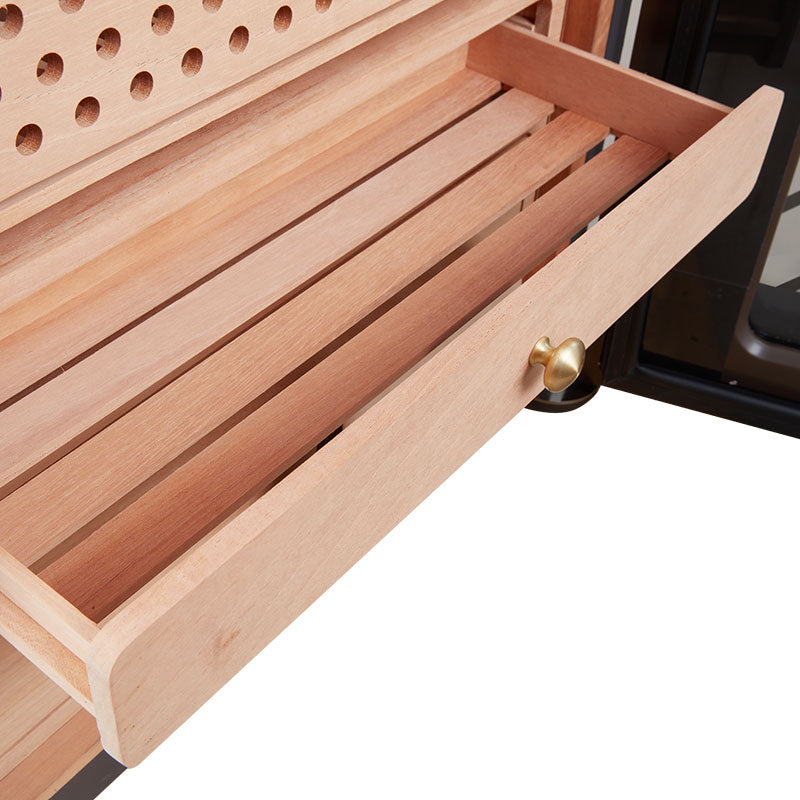
What are cigar humidors made of?
While the world of cigar storage may seem steeped in tradition, the technology behind cigar humidors, particularly their use of wood, is a carefully calculated blend of science and craftsmanship. Let's delve into the technological aspects of why wood is the material of choice for crafting these essential accessories for cigar aficionados.

1. Moisture Regulation:
Wood, especially Spanish cedar, possesses natural properties that make it an ideal choice for cigar humidors. The wood is hygroscopic, meaning it can absorb and release moisture based on the surrounding humidity levels. This innate ability helps regulate and maintain the optimal humidity inside the humidor, creating a stable environment for cigars.
2. Flavor Enhancement:
Spanish cedar, commonly used in the interior lining of humidors, imparts a unique and pleasant aroma to the stored cigars. The cedar's natural oils subtly infuse the cigars, enhancing their flavors over time. This process is not only a result of tradition but a testament to the science of how certain woods interact with the aging process of cigars.
3. Microclimate Creation:
The construction of a wooden humidor contributes to the creation of a microclimate, where temperature and humidity are controlled to perfection. The combination of the wood's insulating properties and its ability to interact with moisture provides a consistent and optimal environment for cigars to age gracefully.
4. Prevention of Tobacco Pests:
Spanish cedar, in addition to its moisture-regulating qualities, has natural insect-repelling properties. This makes it an effective deterrent against tobacco beetles and other pests that could potentially harm a cigar collection. The wood acts as a safeguard, ensuring that the cigars remain pristine and free from unwanted guests.
5. Craftsmanship and Tradition:
While technology plays a significant role, the craftsmanship involved in creating wooden humidors is also integral. The precision in construction, including the creation of a perfect seal and the incorporation of features like dividers and trays, showcases the artistry and attention to detail that goes into making a high-quality humidor.
6. Temperature Buffering:
Wood acts as a natural insulator, providing a buffering effect against external temperature fluctuations. This helps maintain a stable temperature inside the humidor, preventing rapid changes that could adversely affect the cigars.
7. Durability and Longevity:
The durability of well-crafted wooden humidors ensures that they stand the test of time. Properly maintained wood not only contributes to the aesthetics of the humidor but also guarantees its structural integrity, allowing it to serve as a reliable storage solution for years.
In conclusion, the technology behind wooden cigar humidors combines the best of nature and human craftsmanship. The careful selection of materials and the incorporation of age-old principles ensure that these humidors not only serve as protective enclosures for cigars but also contribute to the nuanced and sophisticated process of cigar aging and flavor development. As technology continues to advance, the timeless combination of wood and craftsmanship remains at the heart of the perfect humidor.

1. Moisture Regulation:
Wood, especially Spanish cedar, possesses natural properties that make it an ideal choice for cigar humidors. The wood is hygroscopic, meaning it can absorb and release moisture based on the surrounding humidity levels. This innate ability helps regulate and maintain the optimal humidity inside the humidor, creating a stable environment for cigars.
2. Flavor Enhancement:
Spanish cedar, commonly used in the interior lining of humidors, imparts a unique and pleasant aroma to the stored cigars. The cedar's natural oils subtly infuse the cigars, enhancing their flavors over time. This process is not only a result of tradition but a testament to the science of how certain woods interact with the aging process of cigars.
3. Microclimate Creation:
The construction of a wooden humidor contributes to the creation of a microclimate, where temperature and humidity are controlled to perfection. The combination of the wood's insulating properties and its ability to interact with moisture provides a consistent and optimal environment for cigars to age gracefully.
4. Prevention of Tobacco Pests:
Spanish cedar, in addition to its moisture-regulating qualities, has natural insect-repelling properties. This makes it an effective deterrent against tobacco beetles and other pests that could potentially harm a cigar collection. The wood acts as a safeguard, ensuring that the cigars remain pristine and free from unwanted guests.
5. Craftsmanship and Tradition:
While technology plays a significant role, the craftsmanship involved in creating wooden humidors is also integral. The precision in construction, including the creation of a perfect seal and the incorporation of features like dividers and trays, showcases the artistry and attention to detail that goes into making a high-quality humidor.
6. Temperature Buffering:
Wood acts as a natural insulator, providing a buffering effect against external temperature fluctuations. This helps maintain a stable temperature inside the humidor, preventing rapid changes that could adversely affect the cigars.
7. Durability and Longevity:
The durability of well-crafted wooden humidors ensures that they stand the test of time. Properly maintained wood not only contributes to the aesthetics of the humidor but also guarantees its structural integrity, allowing it to serve as a reliable storage solution for years.
In conclusion, the technology behind wooden cigar humidors combines the best of nature and human craftsmanship. The careful selection of materials and the incorporation of age-old principles ensure that these humidors not only serve as protective enclosures for cigars but also contribute to the nuanced and sophisticated process of cigar aging and flavor development. As technology continues to advance, the timeless combination of wood and craftsmanship remains at the heart of the perfect humidor.
